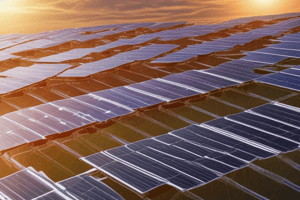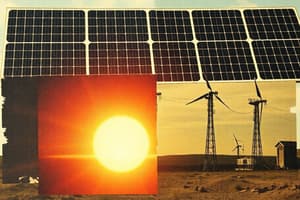Podcast
Questions and Answers
What are solar cells commonly used for today?
What are solar cells commonly used for today?
- Heating large industrial furnaces
- Powering satellites and calculators (correct)
- Generating nuclear energy
- Extracting oil and gas
What is the primary function of a flat-plate collector in a solar heating system?
What is the primary function of a flat-plate collector in a solar heating system?
- To absorb sunlight and heat air or water (correct)
- To reflect sunlight away from the building
- To store energy for later use
- To convert sunlight directly into electricity
What is the meaning of the term 'photovoltaic'?
What is the meaning of the term 'photovoltaic'?
- Generated from artificial light
- Relating to electricity from photons (correct)
- Produced by solar heating systems
- Associated with thermal energy
How do solar cells generate electricity?
How do solar cells generate electricity?
Which of these statements about solar power is true?
Which of these statements about solar power is true?
What advantage would covering 4% of the world's deserts with photovoltaic cells provide?
What advantage would covering 4% of the world's deserts with photovoltaic cells provide?
Why was Albert Einstein awarded the Nobel Prize related to solar power?
Why was Albert Einstein awarded the Nobel Prize related to solar power?
What main purpose do solar cells serve when connected in large arrays?
What main purpose do solar cells serve when connected in large arrays?
What essential feature does the glass covering provide for the flat-plate collector?
What essential feature does the glass covering provide for the flat-plate collector?
In which year was the photovoltaic cell invented?
In which year was the photovoltaic cell invented?
What technology is primarily used to convert sunlight into electricity?
What technology is primarily used to convert sunlight into electricity?
Which of the following statements accurately describes the use of solar panels?
Which of the following statements accurately describes the use of solar panels?
What potential impact could arise from covering 4% of the world's deserts with photovoltaic cells?
What potential impact could arise from covering 4% of the world's deserts with photovoltaic cells?
Which country is mentioned as having the largest solar thermal plants?
Which country is mentioned as having the largest solar thermal plants?
In which year did a solar-powered aircraft fly across the United States without using fuel?
In which year did a solar-powered aircraft fly across the United States without using fuel?
How have solar panels changed in recent years?
How have solar panels changed in recent years?
What role do photons play in solar cells?
What role do photons play in solar cells?
Who received a Nobel Prize in 1921 for research related to photovoltaic power?
Who received a Nobel Prize in 1921 for research related to photovoltaic power?
What is the primary purpose of the Little Sun lamp?
What is the primary purpose of the Little Sun lamp?
What is one disadvantage of using solar energy?
What is one disadvantage of using solar energy?
Who invented the Hollow Flashlight?
Who invented the Hollow Flashlight?
The Little Sun lamp produces its own energy.
The Little Sun lamp produces its own energy.
What type of energy does the Hollow Flashlight utilize?
What type of energy does the Hollow Flashlight utilize?
What type of lamp has been sold 200,000 times since 2012?
What type of lamp has been sold 200,000 times since 2012?
The Hollow Flashlight does not have a ______.
The Hollow Flashlight does not have a ______.
Kerosene is a cheap and safe option for lighting homes.
Kerosene is a cheap and safe option for lighting homes.
What is the weight of the Hollow Flashlight compared to traditional flashlights?
What is the weight of the Hollow Flashlight compared to traditional flashlights?
What do engineers need to consider when designing energy inventions?
What do engineers need to consider when designing energy inventions?
Flashcards are hidden until you start studying
Study Notes
Solar Energy
- Solar energy is light, heat, and other forms of energy given off by the Sun.
- Solar energy can be collected and used to heat buildings and to make electricity.
- The photovoltaic cell was invented in 1954 by researchers at Bell Labs.
- Solar cells have been used on small items such as calculators.
- They have also been an important power source for spaceships and satellites.
Solar Heating Systems
- Most solar heating systems capture solar energy with a device called a flat-plate collector.
- The collector is a large plate of black metal covered with a sheet of glass.
- The plate absorbs sunlight and uses it to heat air or water that flows through pipes behind it.
Solar Power
- Solar cells are also called photovoltaic cells.
- “Photovoltaic” comes from the word “photons”, which are particles that make up sunlight, as well as the word “volts", which is a measurement of electricity.
- Today solar cells are commonly used in small handheld devices like calculators and wristwatches.
- They are becoming more popular for buildings and homes as they become more efficient.
How Solar Cells Work
- Solar cells convert the energy of photons from the sun into electricity.
- When the photon hits the top of the cell, electrons will be attracted to the surface of the cell.
- This causes a voltage to form between the top and the bottom layers of the cell.
- When an electric circuit is formed across the top and the bottom of the cell, current will flow, powering electrical equipment.
- It takes a lot of solar cells to power a building or a home.
- In this case, a number of solar cells are connected into a large array of cells that can produce more total energy.
Fun Facts about Solar Power
- The world's largest solar thermal plants are located in the state of California.
- Many large photovoltaic plants are being built around the world in China, Canada, and the United States.
- If only 4% of the world's deserts were covered in photovoltaic cells, they could supply all of the world's electricity.
- Many people think that as solar panels become more efficient and less expensive they will become a standard feature of new homes and buildings.
- In 1990 a solar powered aircraft flew across the United States using no fuel.
- Albert Einstein won a Nobel Prize in 1921 for his research into photovoltaic power.
Solar Energy
- Solar energy is a source of light, heat, and other forms of energy emitted by the sun.
- Solar energy is used to heat buildings and generate electricity.
- The photovoltaic cell was invented in 1954 and has been used in small devices like calculators and as a primary power source for spacecraft and satellites.
Solar Heating Systems
- Most solar heating systems capture solar energy with a flat-plate collector.
- This collector is a black metal plate covered by glass, which absorbs sunlight and heats air or water through pipes behind it.
Solar Power
- Solar cells are also known as photovoltaic cells, named after photons (light particles) and volts (an electricity measurement unit).
- Commonly used in small devices like calculators and wristwatches, solar cell technology is becoming increasingly popular for buildings and homes due to its efficiency improvements.
How Solar Cells Work
- Solar cells convert photon energy from the sun into electricity.
- When photons strike the cell's top, electrons are attracted to the surface.
- This creates a voltage between the cell's top and bottom layers.
- An electric circuit forms when the top and bottom layers connect, allowing current to flow and power electrical equipment.
- A large array of interconnected solar cells is needed to power buildings and homes, generating a larger total energy output.
Fun Facts about Solar Power
- The world's largest solar thermal plants are located in California.
- China, Canada, and the United States are leading in the construction of large photovoltaic plants.
- Covering just 4% of the world's deserts with photovoltaic cells could supply global electricity needs.
- As solar panels become more efficient and affordable, they are predicted to become a standard feature in new homes and buildings.
- A solar-powered aircraft successfully crossed the United States in 1990 without using fuel.
- Albert Einstein won a Nobel Prize in 1921 for his research on photovoltaic power.
Solar Energy
- Solar energy is produced by the Sun.
- It can be used for heating homes, powering devices and generating electricity.
- The photovoltaic cell, invented in 1954, converts sunlight directly into electricity.
- Flat-plate solar collectors are used in solar heating systems to absorb sunlight and heat water or air.
- Solar cells, also known as photovoltaic cells, use photons from sunlight to create electricity.
- Small solar cells power calculators, watches, and are becoming increasingly popular for buildings and homes.
- Large arrays of connected solar cells are used to power buildings and homes.
Fun Facts
- The world's largest solar thermal plants are located in California.
- Photovoltaic plants are rapidly growing worldwide, with significant projects in China, Canada, and the United States.
- Covering 4% of the world's deserts with solar panels could potentially meet global electricity demands.
- The efficiency and cost of solar panels are improving, making them a viable option for new homes and buildings.
- In 1990, a solar-powered aircraft successfully flew across the United States without using fuel.
- Albert Einstein received the Nobel Prize in 1921 for his research on photovoltaic power.
Energy Inventions
- The Little Sun lamp is a solar-powered lamp designed by Olafur Eliasson and Frederik Ottesen to provide light to people without access to electricity.
- The Little Sun lamp has a light bulb on one side and a solar panel on the other.
- The solar panel converts light energy from the sun into potential energy that is stored in a battery.
- Since 2012, the company has sold 200,000 Little Sun lamps.
- Ann Makosinski invented the Hollow Flashlight, a flashlight that uses the heat from the human hand to power a light bulb.
- The flashlight has a handle made of special tiles that convert the heat from the hand into electricity, powering the light bulb.
- The Hollow Flashlight does not have a battery or an on/off switch, it lights up as soon as you pick it up.
- Solar energy relies on the sun and doesn't work as well at night or on cloudy days.
Energy Sources
- All objects in the universe need energy transferred from a source to function.
- Many devices transfer kinetic energy from wind, water, or people to power devices.
- Each energy source has its own strengths and drawbacks.
Studying That Suits You
Use AI to generate personalized quizzes and flashcards to suit your learning preferences.





